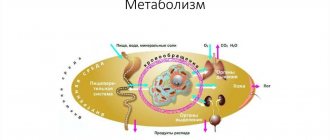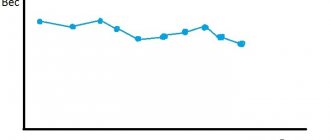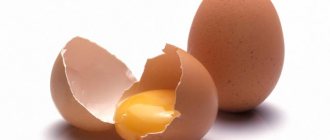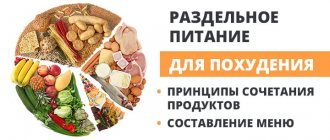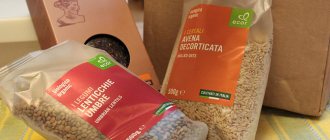From childhood we are taught: everything that fits into our mouth is useful. You must eat plentifully and satisfyingly, and the plate must always be clean - you cannot leave your strength behind. A cake for a good grade, a candy or two received as a reward for a prize at an Olympiad or competition - all this is taken for granted. What is the result? We forget that food should not only be tasty, but also healthy, we overload the stomach and gain new kilograms. If it’s a holiday table, then there’s an abundance of fatty and fried foods; if it’s lunch or dinner, then there’s huge portions that are enough for two or a “gift” to yourself – high-calorie fast food. Over time, what we eat during the day becomes a cause of grief, and not pleasure at all: standing on the scales, we state with horror the fact that only obesity and health problems lie ahead. Think about how you can avoid such a sad scenario? The answer is the same for everyone: it is important to change your lifestyle, starting with a proper balanced diet. What is it and why is it so important to monitor what food is on our table every day? This is vital simply because our main principle should be a simple formulation known to everyone: “do no harm.” Our stomach is not a bottomless well into which we can throw more and more “unprofitable” products. The habit of “pleasuring” yourself with sweets and fatty foods can lead to serious problems: the heart will stop coping with its usual work, blood sugar levels will rise, and you can forget about the ideal figure. Agree, everyone wants to look at themselves in the mirror, admiring what they see, and not holding back sighs of despair. What to do? Start writing down the rules for a balanced diet right now. Our additional services: Bioimpedance | Marutaka Massage | Pressotherapy | Ion-Detox
What is a balanced diet
A balanced diet is a nutritional system that provides the body with the “building” substances, vitamins and minerals necessary to maintain the functionality of cells, tissues, individual organs and the entire system that is the human body.
Content:
- What is a balanced diet
- Molecular basis of a balanced diet
- How to make your diet balanced: basic rules
- Components of a Balanced Diet
- What's prohibited
- Everyone has their own balance
- Balanced diet for weight loss
Failure to maintain a balanced diet can lead to various health problems: from chronic fatigue and lack of energy to dysfunction of vital organs. This type of diet does not belong to nutritional systems designed specifically for weight loss, but by following it, you can be sure that the body will not accumulate extra pounds of fat. A properly formulated balanced diet should contain all major food groups in optimal proportions. Compliance with the recommended caloric intake will help you avoid excess weight. But the correct calorie content is not the only requirement for a balanced diet. It is important to ensure that the body receives the proteins, fats, carbohydrates, micro- and macroelements, vitamins, fiber and other beneficial substances it needs every day. Most nutritionists in the world agree that one of the most balanced is the classic Mediterranean diet. If you take it as a basis, it’s easy to create a balanced menu for a week or even a month.
conclusions
As you can see, switching to a healthy diet does not always have to be accompanied by stress and restrictions. Make the process bright and interesting, perceive it as a new experience or an exciting game. Tell yourself: “I want to eat healthy!” Experiment with flavors and ingredients, learn to cook delicious dietary dishes, discover new products and you will see that healthy eating is not boring at all. And when, in addition to feeling good, you see a minus on the scale, we are sure that a healthy diet will become your lifestyle and a new, good habit. Be healthy and happy!
Molecular basis of a balanced diet
No diet can be called balanced if it does not contain enough carbohydrates, fats, proteins, fiber, vitamins or minerals. Let's briefly remember why the body needs these substances.
Carbohydrates. It is very difficult to achieve a zero carbohydrate content in the diet, but if this happens, then you can be sure that such nutrition will do more harm than good to the body (even with severe obesity). Carbohydrates serve as the main source of energy. In addition, they are necessary to maintain muscle shape (with a deficiency of carbohydrates, building protein from the muscles is consumed), these same substances serve as “food” for beneficial bacteria living in the intestines. Nutritionists advise composing your diet so that it consists of 45% carbohydrates (ideally, these should be slow carbohydrates).
Fats. Our body needs fats of plant and animal origin. They serve as an energy source, are indispensable for the proper functioning of the brain and nervous system, are important for maintaining the health of the skin and other tissues, are a component of cell membranes and an organic basis for the synthesis of steroid hormones. Fatty foods serve as a source of essential fatty acids (from the omega group), and are also indispensable for the proper absorption of fat-soluble vitamins A, , and.
Squirrels. The human body is, in fact, a collection of different proteins (our body contains from 30,000 to 50,000 types of protein compounds). Protein food is a source of essential amino acids, it is necessary for the formation of DNA, enzymes, hormones and special proteins in the body responsible for the transport of oxygen in the blood and the growth of muscle tissue, it is necessary for the normal condition of bones, hair, and nails. Without exaggeration, every cell in the human body needs proteins. The source of this nutrient should be natural food, since the bioactivity of protein food supplements is much worse. Although protein abuse is just as dangerous for humans as protein deficiency.
Cellulose. Another name for this substance is dietary fiber. This is a special type of carbohydrate that is not absorbed by the body. The indispensability of fiber is that it is responsible for the normal functioning of the intestines and maintains healthy microflora in it, improves digestion, removes toxins from the body and reduces the risk of developing cancer. But when taking large amounts of fiber, it is important to ensure that you drink enough fluids, otherwise there is a risk of constipation.
Vitamins. You can talk about the benefits of these substances for a very long time, and about each separately. In short, each of them performs its own function, which is collectively manifested by the correct growth, development and smooth functioning of the entire system of the human body. As a rule, a lack of any of the vitamins triggers a domino effect, and as a result, the entire body suffers.
Minerals. Our bodies cannot produce minerals on their own, so it is important to replenish their reserves from food. Each mineral, like vitamins, plays a specific role in the body. Maintaining mineral balance is the key to the balanced functioning of all organs and systems, including healthy bones, teeth, skin and hair, blood composition and healthy metabolism.
Genetics
“The apple doesn’t fall far from the tree,” we say about the character and inclinations inherited. The same can be said about health, figure, tendency to be overweight. All these features are passed on to us by inheritance along with the genetic code of our parents. To identify diseases and predispositions, it is necessary to take a genetic test. When this is not possible, then pay attention to your relatives.
- If you have close relatives who were overweight from an early age, then you are likely to have a predisposition to obesity.
- If anyone in your family has become overweight with age, you may also be a carrier of a gene that causes you to gain weight over the years.
What to do in both cases? Do not panic. Genetic predisposition is not a death sentence. Metabolism can be accelerated. This may take longer than others and require additional effort. But everything is in your hands.
Before you start losing weight, I advise you to take a blood test for platelets, a hormone test (for women it is especially important to check the thyroid gland), it is also worth finding out if there is a deficiency of vitamins: iron, vitamin D, iodine. It is especially important to undergo these tests for those who have had an abdominal circumference of more than 100 cm for a long time (from two years).
After the tests, competent work with health begins, in which an individual nutrition plan, drawn up taking into account the genetic characteristics of your body, plays a significant role.
How to make your diet balanced: basic rules
For a truly balanced nutritional system, it is important to pay attention not only to what we eat, but also how often. According to most experts, proper nutrition should consist of 5-6 meals, although some nutritionists (mainly in the West) defend the right to 3 meals a day. But both the former and the latter agree that perhaps the main meal of the day is breakfast, so it should absolutely not be skipped. Each meal should contain foods from different food categories (during the day you should eat food from all permitted groups), and portion sizes should be moderate and correspond to the required calorie content. By the way, there are several opinions regarding calorie content. The most popular version recommends that a man’s daily diet should be 2320 kcal, while women need only consume 1900 kcal per day.
Alcohol in a balanced diet is, if not completely prohibited, then strict restrictions are imposed on its use. In addition to alcohol, you should also control portions of sugar and salt, and also limit the consumption of foods rich in saturated lipids and trans fats, and be careful about cholesterol foods.
In addition, a diet cannot be called balanced if the daily diet includes less than 2 liters of clean still water and there is no room for moderate physical activity. Water and sports are the two “building blocks” without which it is impossible to achieve balance in the body.
Components of a Balanced Diet
Dairy
Different types of cheese, milk, sour cream, kefir, yogurt and other dairy products are indispensable in the diet as a source of calcium, protein and vitamin D. People with lactose intolerance should focus on fermented milk products, and replace cow's milk with nut or soy milk, or take calcium in as a dietary supplement.
Protein food
This group includes lean meats, poultry, fish, beans, nuts, seeds, eggs, and soy products. It is important that in addition to protein, foods in this category contain many other beneficial substances. For example, meat contains a lot of iron, beans contain fiber, eggs contain an impressive complex of vitamins and minerals, and sea fish, in addition to protein, is rich in omega-3 fatty acids. To prepare any of these products, it is important to choose methods that require the addition of a minimum amount of fat. It would also be better to avoid processed foods and sausages, as they are usually oversaturated with fats and sodium. When compiling a menu for the day, it is important to take into account the fact that approximately 30-35% of the total calorie content should be protein foods. This means that a man should eat about 60 g of protein daily, and a woman should eat about 55 g.
Fruits
Fruits contain no fat, most are low in calories, but are very nutritious. By including different types of fruits in your diet, you can get plenty of fiber as well as most vitamins and minerals. People who prefer fruit juices and dried fruits should remember that fruit products in this form contain much more calories, so it is advisable to control portions.
Vegetables
As a rule, this is the lowest calorie food group. But nevertheless, vegetables are an excellent source of vitamins, minerals and fiber, and therefore are considered essential for humans. A balanced diet involves eating a variety of vegetables, cooked with minimal fat. You should also be careful with starchy vegetables. They are advised to consume no more than 100 g per day.
Cereals
This food group is necessary as a source of so-called slow (correct) carbohydrates. Nutritionists advise regularly consuming whole grains, as they contain more fiber, as well as the maximum amount of B vitamins. Different types of cereals, whole grain bread and some durum wheat pasta are what, according to experts, will benefit the human body. body. But it is useful to avoid cereals, sweet baked goods and crackers with sweeteners or other flavoring additives. Nutritionists advise consuming at least 30 g of cereals every day.
Fats and oils
In fact, fat is not something dangerous for the body; on the contrary, fatty acids are essential for maintaining the functionality of most organs. Fat becomes dangerous only when it is in excess or in the wrong form (the same trans fats). But small portions of butter, olive or other types of vegetable oils should be present in the diet. Fatty foods should account for 1/5 of the daily calorie intake. By the way, do not forget that the source of healthy fats is not only different types of oil, but also nuts, seeds, sea fish, avocados, and olives.
What's prohibited
Foods that do not fit into the above categories are considered unhealthy for humans and are not included in a balanced diet. Among the most popular foods that “unbalance” a healthy diet are candy, chocolate, cakes, chips and other fast food products. If you really want to, then on rare occasions you can treat yourself to dessert as a form of relaxation, but in this case it is better to give preference to an option containing less than 145 kcal.
Allergies and intolerances
Allergy is a disease of the 21st century. There are practically no people left on the planet who are not allergic to this or that product. An equally dangerous companion to allergies is food intolerance. But with allergies, everything is more or less clear: you either have it or you don’t. Food intolerance is a mysterious and insidious enemy. A person can live with celiac disease (gluten intolerance) for many years and not know about it, and write off digestive problems as a “disorder.”
There is another extreme: when people voluntarily refuse to consume dairy products and wheat products, believing that it is better to be on the safe side. Everything would be fine, except that dairy products contain calcium, which is essential for people, and if we exclude it from the diet unnecessarily (especially after 45 years, when, as we know, calcium begins to be washed out of the bones), we can harm ourselves. And there can only be one correct decision: before adjusting your diet, get checked for allergies and food intolerances. Only if the diagnosis is confirmed, refuse certain foods.
Everyone has their own balance
This diet is not a nutrition plan with a clear definition of the amount of food. A balanced menu for everyone is unique, their own. What different organisms need depends on different factors:
- age;
- gender;
- lifestyle;
- health conditions;
- physical activity.
In addition, vegetarians, meat lovers, pregnant women and athletes have their own balanced nutrition options. There are also variations of the diet to support healthy weight and for obese people.
Standard option. This is the skeleton around which you can create different diet options while maintaining the key principles.
Breakfast of any balanced diet consists of carbohydrates (cereals), 1 fruit and protein. A snack is always a fruit or vegetable (can be in the form of juice or salad). A balanced lunch should contain proteins, vegetables and complex carbohydrates (for example, a slice of whole grain bread or cereal). The second snack in this food system is dairy products and a vegetable or fruit. For dinner, it is good to eat fish or meat (alternate), beans, complex carbohydrates and vegetables.
Meat free option. For breakfast, you can prepare an omelet from 2 eggs (in olive oil) and drink green tea. For a snack, fruit salad is suitable, and for lunch - bean soup and cabbage salad. For a second snack, choose nuts or dried fruits, and for dinner, risotto and fresh tomatoes are suitable.
An option for maintaining a stable weight. Weight-conscious people can have breakfast without remorse with their favorite porridge with 2 egg whites, after which they can eat another grapefruit and drink tea or coffee. It is healthy to have cottage cheese as a snack, and to have fish and stewed vegetables for lunch. For a second snack, it is useful to eat yogurt and an apple. If you don’t want dinner to leave fat on your sides, then your option is stewed cabbage with chicken breast and a glass of herbal tea.
Option for obesity. There are special medical diets to treat obesity, but a balanced diet can also help you lose weight. It is useful for obese people to have breakfast with low-fat cottage cheese and carrot salad. For snacks during the day, you can take fruits, berries or cottage cheese. For lunch it is useful to eat vegetarian borscht, 100 g of lean meat and some stewed vegetables. A good option for dinner is steamed fish and vegetables.
Option for athletes. Breakfast for active people can consist of oatmeal, boiled eggs and milk. You can have lunch with potatoes, your favorite type of meat and salad, and for dinner, for example, fish and a salad of boiled beans. For a snack, choose fruit or vegetable juices.
Option for pregnant women. Pregnancy is a special period when the female body requires a specific diet. The following menu can serve as an example. Breakfast is milk porridge, a snack is yogurt, lunch is pea soup, fish and stewed vegetables, a second snack is fruit salad, and for dinner unsalted cheese and vinaigrette.


